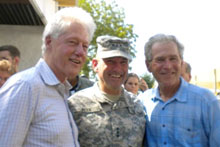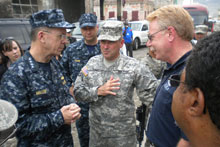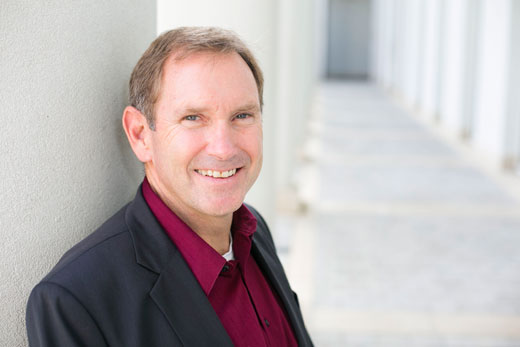Five years ago this week, Ken Keen was sitting on a hillside veranda overlooking Port-au-Prince, Haiti, discussing emergency preparedness with a U.S. ambassador, when the bucolic landscape was seized by violent shaking.
Today, Keen is associate dean for leadership development at Emory's Goizueta Business School.
But on Jan. 12, 2010, he was Lieutenant General P.K. "Ken" Keen, military deputy commander of the U.S. Southern Command, with responsibility for 32 countries and territories in the Caribbean and Central and South America.
Having survived earthquakes before in both Italy and Colombia, he immediately recognized the vibrations. But never had he experienced anything like this temblor — a 7.0 earthquake that would paralyze the country.
Across the tropical valley that afternoon, Keen watched the rapid rise of billowing dust clouds as densely packed concrete buildings began to collapse, leading to the deaths of some 230,000 people and displacing another 1.5 million.
With a deep background in crisis response, in many ways he was primed for the moment.
As the commander of Joint Task Force–Haiti, Keen would be called to lead among the largest U.S. military-based responses to a foreign disaster to date, including the command of more than 22,000 personnel, 19 ships and 57 aircraft.
Overseeing a response budget of more than $500 million, his assignment encompassed a massive endeavor: Coordinating U.S. earthquake response efforts and collaborating with the U.S. ambassador, Haitian prime minister and senior United Nations officials, as well as opening an aerial port of entry for first responders to provide emergency medical care for more than 100,000 Haitians.
Today, Keen brings those skills and experiences to managing Goizueta's school-wide leadership program, which blends a robust curriculum, leadership coaching and experiential learning opportunities to develop principled leaders.
Yet Haiti is never far from his mind. He continues to be drawn back to the country, volunteering his consulting skills for ongoing humanitarian relief work.
Emory Report caught up with Keen recently to discuss how a career in crisis management and military leadership now informs his role at Goizueta.
What drew you to a career in military service?

Ken Keen with former presidents Bill Clinton and George Bush in Haiti.
I was the youngest of five children, raised in Leslie County, near Hyden, Kentucky, deep in the heart of coalmining country in the Appalachians. When I was 13, my father decided to retire from teaching school and move north. He wanted me to go to college — my two older brothers had gone into (military) service and bypassed college. He sold everything and we started over just west of Chicago. It was a culture shock and a growing experience, but very useful. I came out of it wanting to further my education.
Where did those interests take you?
My first year I went to Northwestern Missouri State College, primarily because my brother-in-law went there — but I didn't like being out in the middle of nowhere. I told my father I wanted to transfer to Eastern Kentucky University, fully intending to teach math, as he had (Keen graduated with a bachelor's degree in mathematics). Once I got there, I met an Army officer serving as an ROTC (Reserved Officer Training Corps) instructor who convinced me that I could join ROTC and offered me a scholarship. He told me, "You'll get to see the world." I was intrigued. I loved the challenges of what I was experiencing as a cadet. I also met my wife there — she was one of the first women in ROTC on our campus.
Did you ever anticipate a military career that would span 38 years?

Ken Keen in Haiti during a visit by Admiral Mike Mullen (left), chairman of the joint chiefs of staff.
When I graduated and was commissioned into the Army, I thought, "I'll spend four years in the Army, come back and teach school." So I never entered the Army with the intention to stay. But by the late '70s and early '80s, the Army — like the nation — was changing, with a renewed emphasis on leadership and the development of our leaders, with better funding to be trained and ready. It was an exciting time to be in the Army, and I never left.
Did you realize your dream of seeing the world?
Over 38 years, we moved 23 times. I spent over 11 years working and living abroad in a number of Latin America countries, Germany, Egypt, Haiti and Pakistan. I also served on three U.S. Embassy Country Teams leading all military forces in Colombia, Haiti and Pakistan during crisis periods.
Your service provided many leadership opportunities. Are the best leaders simply born that way or are those skills learned and developed?
I say yes to both. It is a journey that people take, regardless of whether or not you come by it with natural attributes or charisma. I think a lot of what you become as a leader starts in the home with your parents. Just from being around my father I began to learn how to be stern but caring, to offer discipline but also have empathy. My mother also laid down the law with integrity, "We're going to do this because it's right, not take the easy way out."
In high school, I wasn't in leadership positions. I was not a great athlete, never made the starting lineup. I wasn't the captain of the clubs, the leader of the class. But when I got into college and ROTC, it introduced me to an aspect of working as a team and I enjoyed the challenge of leading those teams. How did I learn to lead? I had some great role models and the opportunity to lead and learn in some of the best organizations in the military.
You're known for your unique brand of caring for and connecting with those under your command. What is the role of compassion in leadership?
In the classroom, we'll talk about many styles — George Patton's speech to the Third Army, Gandhi speaking to British Parliament. You have to recognize that different circumstances require different leadership styles. But I would argue you have to have compassion and it has to be genuine.
As a young lieutenant, I was an infantry officer and became a platoon leader, with about 30 men under my command. Our platoon sergeant told me to "listen twice as much as you speak, listen intently to those under your command, and get to know them." He pulled out a green notebook — he called it a soldier's notebook — and told me, "My job is to make you successful, the best officer and leader in your unit. I want you to talk to every soldier in our platoon. Find out their mother's name, father's name, the size of their hat and shoes, if they're married and who their wife is. Get to know them. Sit down and talk to them." The lesson is you need to know your soldiers, their families, what's going on in their lives. I learned that from a crusty old platoon sergeant. Yet he showed great empathy and compassion in the way he cared for his soldiers. I think there are tremendous parallels for the corporate world.
Have you been back to Haiti to see how the country is healing?
Yes, I continue to do pro bono work with J/P Haitian Relief Organization (J/P HRO), one of the NGOs (non-governmental organizations) that I worked with during the earthquake. When I left, they asked me to sit on their board. I've gone back and volunteered with my wife and daughter in Haiti every year. They've also asked if, along with a colleague here, I would look at doing leadership development for them.
What lessons linger about your experience in Haiti?
The resilience of the Haitian people, regardless of their circumstances. Walking through displaced persons camps, children would greet you with smiling faces. Their mothers had an attitude of "We'll get through this, we'll make the best of this." I found the Haitian people to be extremely warm and friendly. I was uplifted to interact with them — they energized me. It was one place I felt we could make a difference and I still do.

